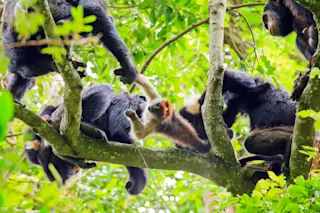Human speech and cooperation are intertwined. For example, talking can help us defend a basketball team or take down prey. Distantly related mammals like dolphins also vocalize to coordinate. But experts still debate when it evolved in primates.
In a new study, experts argue that vocal coordination evolved before humans split from chimpanzees and bonobos. They analyzed cooperative chimp hunts and showed that vocal exchanges facilitate their collective pursuit. The finding, the authors say, could mean that communication and cooperation are at least six million years old, originating before we separated from other great apes.
Chimps work together to capture and eat monkeys. It’s dangerous, energetically taxing and doesn’t guarantee a meal at the end of the day. Larger groups capture prey more often, and it would help apes to communicate their intent, joining a collective hunt and assessing the groupwide enthusiasm. To test if this communication network exists in ...














